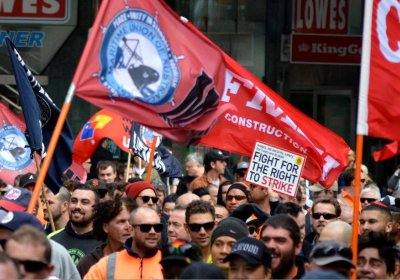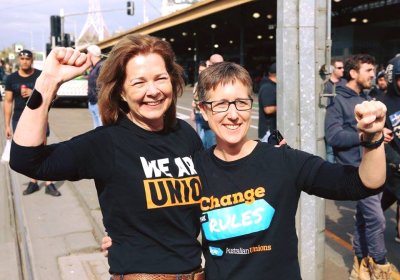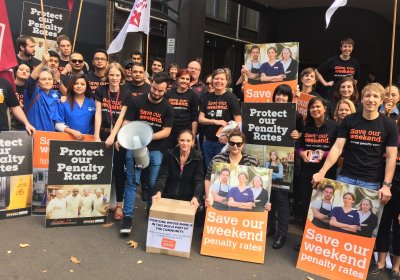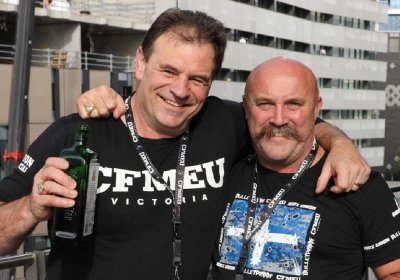Up to 5000 unionists marched through Sydney’s CBD on September 6 to demand the right to strike and the abolition of the Australian Building and Construction Commission (ABCC).
Australian Council of Trade Unions (ACTU)
A study by the International Monetary Fund (IMF) on labour relations in 26 developed economies, including Australia, has confirmed that workers’ real wages have fallen because labour market deregulation has “gone too far”.
The IMF researchers noted the “statistically significant, economically large and robust negative effect of deregulation” on labour’s share of national income, with workers’ share of national income falling drastically from 1975 to 2015.
Australia Workers' Union (AWU) members at Alcoa refinery plants and bauxite mines in Western Australia have been on strike since August 8. At stake in the dispute is the job security of 1600 workers. To mark the strike’s 20th day, site meetings were held on August 27 at the ongoing picket lines set up outside Alcoa workplaces in Pinjarra, Kwinana, Wagerup, Huntley and Willowdale.
Former national secretary of the Textile, Clothing and Footwear Union of Australia (TCFUA) Michele O’Neil was elected president of the Australian Council of Trade Unions (ACTU) at its congress in Brisbane over July 17 and 18. She replaces Ged Kearney, who won the seat of Batman, now renamed Cooper, in Melbourne in March. Sally McManus remains secretary. The following is her President’s Address to the congress.
* * *
The latest round of penalty rate cuts, which reduce weekend and public holiday penalty rates for staff in the retail, hospitality and pharmacy sectors by 10–15% from July 1, is estimated by the ACTU to affect 700,000 workers.
Shop, Distributive and Allied Employees’ Association national secretary Gerard Dwyer said the penalty rate cuts would cost many retail and fast food workers between $2000 and $6000 a year.
A new round has been launched in the ongoing struggle over the protection of workers' rights to their lifetime savings in Australia's $2.6 trillion superannuation industry.
The Productivity Commission's latest report into Australia's $2.6 trillion, scandal plagued, superannuation industry has called for a number of reforms. While noting a number of serious problems with the current system, its proposals to tackle them are just as flawed and still put workers' earnings at the mercy of the market.
The Sydney University branch of the National Tertiary Education Union (NTEU) held a forum on campus on June 13 to discuss how to organise to rewin the right to strike.
Professor John Buchanan, from the University of Sydney Business School, told the forum: "The current Fair Work Act (FWA), introduced by the previous Labor government, is the second worst industrial relations legislation in Australian history, after John Howard's Work Choices.
As the government’s criminal case against Construction, Forestry, Mining and Energy Union (CFMEU) officials John Setka and Shaun Reardon ended in embarrassing collapse, unions called for the repeal of draconian secondary boycott laws.
Sympathy strikes are one of the most common forms of secondary boycott. They involve a union taking industrial action to force a company to cease trading with another company until the targeted company agrees to industrial demands. The law against secondary boycotts thus interferes with the right of workers to campaign collectively.
The Australian Council of Trade Unions' new Change the Rules campaign is well underway.
In conjunction with a professional advertising and social media strategy, the campaign was launched on April 7, building up to the 12 Days of Action in early May around the May Day rallies. Thousands of people attended these rallies across the country, culminating in 120,000 workers marching in Melbourne on May 9.
May Day this year, held on May 6 in Sydney, was the strongest, most powerful and largest May Day I have marched in for years.
I joined with dozens of union contingents comprising thousands of workers in Sydney, chanting “The workers united will never be defeated” and “What do we want? The right to strike.”
More than 60 unionists and supporters of the labour movement met after the Sydney May Day march on May 6 to discuss the next steps of the Right to Strike campaign.
The meeting, which built on the success of a previous meeting held on April 14, called for the critical addition of the right to strike as a core demand of the Australian Council of Trade Unions' (ACTU) Change the Rules campaign.
In the biggest union mobilisation in Australia in more than a decade, up to 120,000 unionists and supporters descended on the streets of Melbourne on May 9.
The protest was organised as part of the Change the Rules campaign. The rally followed a mass delegates meeting in April and was the conclusion of nearly a fortnight of union actions across the country to launch the campaign.
- Previous page
- Page 8
- Next page











